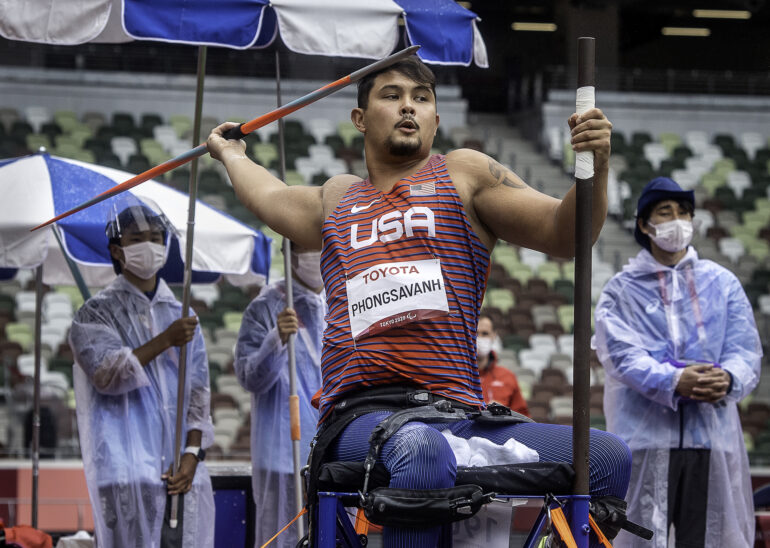On October 24, 2015, Justin Phongsavanh walked out of a McDonald’s in Ankeny, Iowa, unaware he was taking his final steps. Until that cool fall evening, the high schooler had been an avid sportsman and was gearing up for a career as a journeyman electrician. A gunman’s bullets would abruptly and irrevocably change the course of Justin’s life.
After the shooting left him paralyzed from the diaphragm down, Justin found new purpose through adaptive sports, becoming a Paralympic athlete and setting records in seated javelin. Justin now reflects on the challenges he’s faced, the victories he’s achieved, and the difficult questions that still lie ahead—including whether LA 2028 will mark the next chapter in his extraordinary journey.
In this conversation with Make It Better Foundation director of photography Mark Edward Harris, Justin reflects on the shooting that changed everything, the realities of life as a Paralympian, and what it takes to chase greatness after unimaginable loss.
Editor’s Note: This transcript was edited for length, grammar, and clarity.)
Make It Better: What was your journey to becoming a Paralympian?
Justin Phongsavanh: To talk about how I got started in the Paralympics, I have to go back to the athlete and the person I was prior to acquiring my disability. When I was five years old, I was adopted after two years bouncing around the Iowa foster care system. I had severe ADHD, and when my adoption mom got me, she thought, “What’s the best way to remedy this? Throw him into sports.” So that’s what she did. I went straight into wrestling, then football, then track, then rugby.
MIB: What happened to your biological parents?
JP: They lost me at two years old. They both went to prison when I was two years old, I believe for the manufacturing and distribution of drugs. Years later I met both of them. My biological father is first generation Laotian. My mom is white. They met in Des Moines. My adoptive parents are also Laotian and white. I was perfectly placed into the same ethnicity family.
MIB: Once you got settled and evolved into a star athlete did you have thoughts of going pro?
JP: I had no aspirations to become a professional athlete or a collegiate athlete of any kind. I was focused on becoming an electrician and joining a union.
MIB: When did that aspiration change?
JP: On the fateful day of October 24, 2015. My friend and I were at a McDonald’s, and when we were leaving and walking over to our car, an individual who had followed us out, pistol-whipped my friend before even saying a word. I got in between my friend and the perpetrator to try and protect my friend. He raised his gun to my face and asked me if I wanted to die. His wife then intervened. They went back to their car but the individual, after getting in, opened his door and began firing. My friend got hit once, and I got hit twice. Then he left and turned himself into the police and bailed himself out that same night. He had a bad case of PTSD from the military and he got lesser charges instead of two counts of attempted murder. My friend is physically 100 percent but still battles mental issues from the event and I have a T2 complete spinal cord injury.
MIB: Why did he follow you guys out into the parking lot?
JP: Supposedly he didn’t like how we presented ourselves in the restaurant. We were 18-year-olds. Maybe we were a little loud. He was off of his PTSD medication and was drinking that night. A lot of factors played into the rationality of his decision-making. He was in the military and in the thick of the war right after 9/11 and experienced a lot of traumatic things, and when he came back stateside I don’t believe he got the necessary resources that he needed.
MIB: What happened to him?
JP: He’s in Des Moines. Because he was a first-time offender and had PTSD, he did about a year in prison. We lived about six miles apart when I was in Des Moines. I’m in Georgia now.
MIB: Did you run into him after the incident since you lived in such close proximity in a relatively small city?
JP: I don’t believe so. I don’t know if I would recognize him. He would know what I looked like because I’m in a wheelchair. But ignorance is bliss. I’d probably just ignore him. Let God do his judgment on him. I’m not willing to take matters into my own hands and jeopardize my future.
MIB: How did you move forward from that horrible night in the parking lot? Were you in a hospital for an extended time?
JP: One of the .40 caliber hollow point rounds went through my lung and split into about five fragments; one found itself in my spine. I was in the ICU at MercyOne, the biggest hospital in Des Moines, for more than a week. I had a chest tube in my lung to pump out the blood, an IV in my neck, all that kind of stuff. From the hospital, I was shipped to a rehab facility in Omaha, Nebraska called Madonna. Spinal cord injuries are one of their specialties.
MIB: Your pre-incident life as an athlete must have helped you in your recovery.
JP: In high school I would train for the sole purpose of being ready for Competition Day. Competition Day, when you’re doing rehab for a disability, is the rest of your life. So I took it very seriously.
I had a lot of eye-opening experiences at Madonna because I was in the pediatric unit. I got to interact and bond really well with everyone and dove into the world of disability across a wide spectrum. From Madonna, I went to a rehabilitation center in Lincoln, Nebraska, called Qli, for real-world training. I had my own room and they had a kitchen to practice cooking skills. They also had outings. Up until that point, I’d never gone out in public with my wheelchair. They showed me how to open doors, navigate, [and] go up curbs, things most people take for granted. By Valentine’s Day 2016, I was ready to go home.
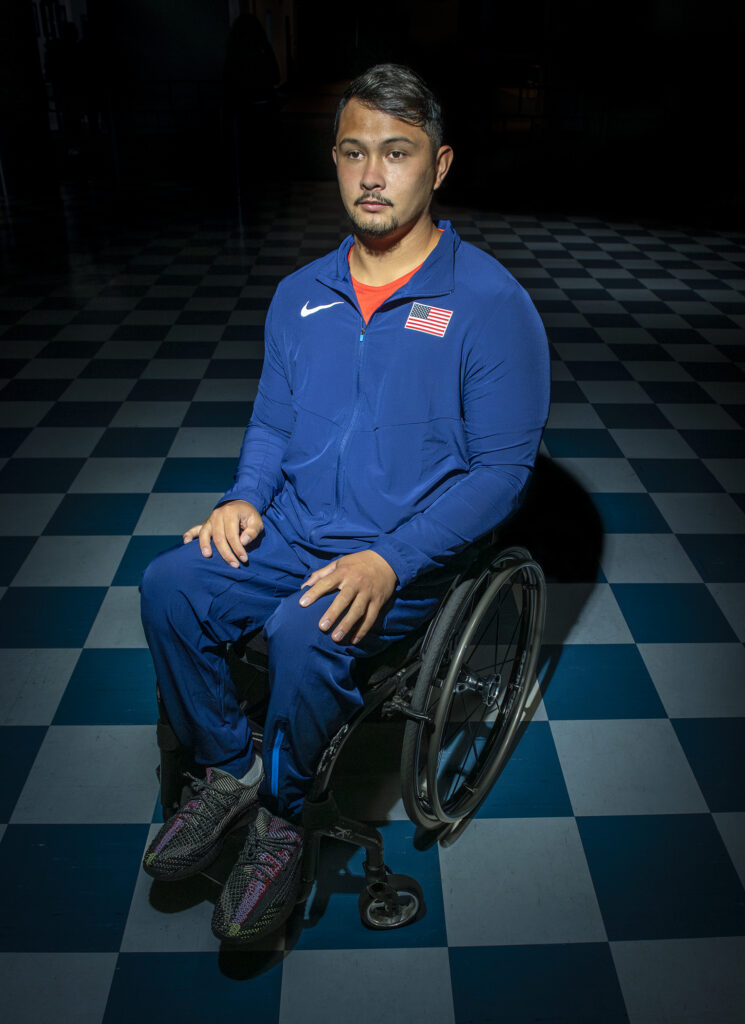
MIB: When did you start plotting out your future? Was being an electrician still on the table?
JP: That was no longer a possibility. At Qli they had counselors for career development. “What are your aspirations? What do you like to do? Here are some resources on how to do it.” I went down the list of the best-paying desk jobs. I ended up settling on accounting. I like numbers. When I went home, Des Moines Area Community College was in midterm so I couldn’t enroll right away. I was bored being at home all the time, so I looked up adaptive sports clubs near me to get out of the house. I found Adaptive Sports Iowa and started playing wheelchair basketball. It was fun, but I wasn’t a big fan, so the director introduced me to track and field. He had an extra throwing chair and some shot puts and let me borrow them.
MIB: Why did you decide that javelin was a better fit?
JP: It’s really hard to have the explosive power of shot put and the flexibility, dexterity and speed for the javelin in one body. You don’t have to be the strongest guy on the field to throw the javelin the furthest; you have to be technically sound, so I refocused on that. I went to my first competition that summer in Illinois at the Great Lakes Adaptive Sports Association. They welcomed me with open arms and explained the classification process. I did shot put, discus, javelin, and powerlifting. I set all the junior records. Then, in 2017, I went to a training camp in Wisconsin, Gateway to Gold, where I met my now-coach Erica Wheeler.
I graduated college that summer with an Associate’s degree in business and financial administration and then went to a competition in Ireland put on by the International Wheelchair and Amputee Sports Federation (now World Abilitysport), did well, was internationally classed and then invited to the U.S. Olympic Training Center in Chula Vista where I lived from 2019 to 2021.
MIB: In addition to the physical adjustments, you’ve had to deal with the economic realities of adulthood. That has to be particularly challenging for an athlete that’s not in professional sports. How do you do it?
JP: Javelin seated throwers typically do three or four competitions a year but because of the nature of traveling with all of our equipment, money gets eaten up quickly. My throwing chair alone is 66 pounds. The only way Paralympians can make money as athletes is to be on the national team and have sponsors. I currently have two sponsors, but since I didn’t medal in Paris, they will no longer be going forward with me. A lot of athletes find it really hard not only to gain employment with a disability, but to also find the flexibility of an employer to be able to take off a week for the trials and two weeks off for the Paralympic Games.
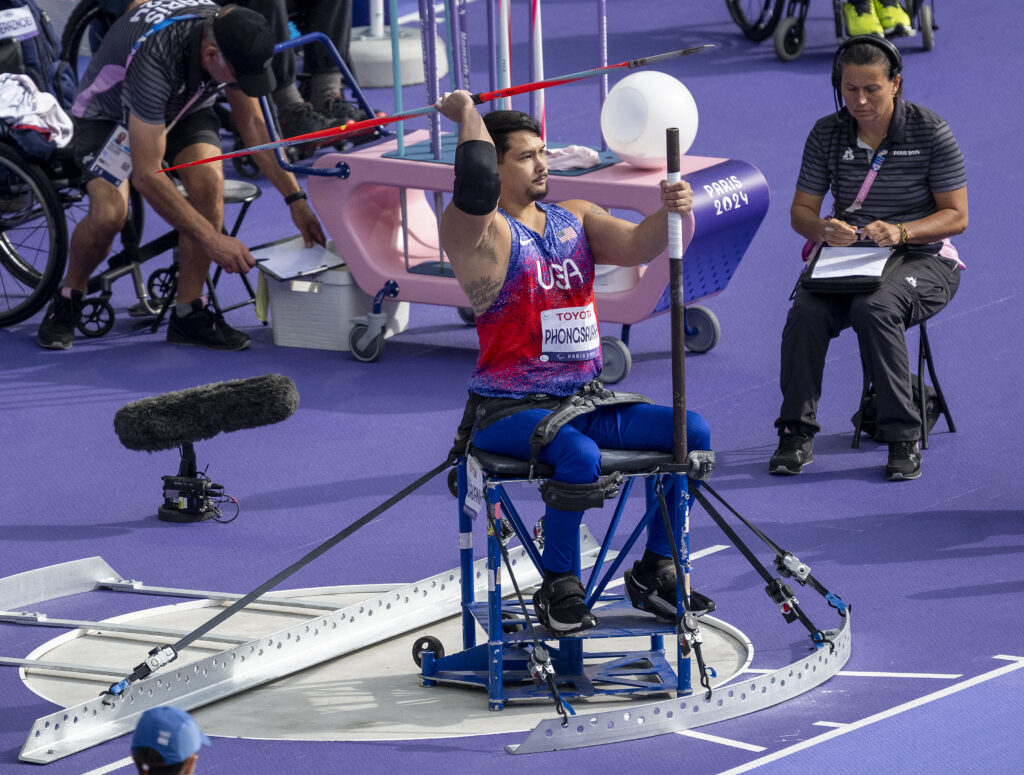
When I was in Iowa, I was working as a call center representative and then a survey company. I was fortunate enough to buy a house in early 2017 and move in with five of my best friends, and everyone pays rent. After getting a Master’s in accounting and an MBA in marketing in 2022, I decided to focus on training for the Paris 2024 Paralympics. So now I’m applying for a job. I did just re-enroll into a certificate course through Cornell for data analytics to expand my horizons.
MIB: Do you see LA 2028 in your future?
JP: We all have pivotal moments in life where fear creeps in. But they can be catalysts that propel us to new heights. Unlike in Tokyo, I wasn’t able to podium in Paris. It was one of my worst performances of the year and for no good reason. So here I am again at a crossroads. Do I end my ambitions of being an athlete, or do I keep going? Is my body gonna hold up? It’s different for an Olympian; if they tear a leg, they get on crutches and can get around. If I tear a shoulder, I can’t wheel and be independent anymore. But I have every aspiration to go to LA 2028. I’m healthy, and I have that knot in my stomach that doesn’t sit well with how Paris ended, and I would hate to end my career like that even though I still hold the world record in the F54 Men’s Seated Javelin category with a distance of 33.29 meters. My goal is to win gold at the Paralympics.
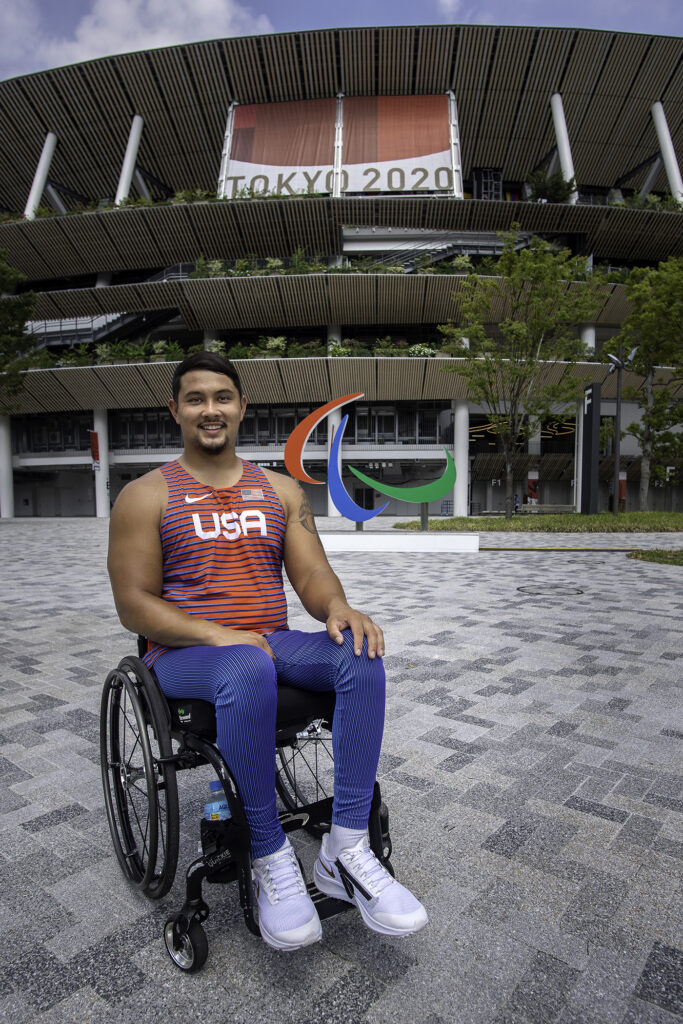
MIB: Has the javelin changed much since antiquity?
JP: Basically, it’s the same, a long stick with a pointy end. The modern javelin is weighted to a specific weight and used to be perfectly balanced. But the rules had to be changed because javelinists were throwing 100-plus meters, and there wasn’t a stadium that could hold it. So it was decided to shift the weight forward so the javelin turns over faster. We have old records and new records.
MIB: We first met at the Tokyo 2020 Paralympics, where you won the bronze and shared the podium with athletes from Iran and Russia. It was such a positive thing to see athletes in solidarity despite their governments being advisories. The Olympics and Paralympics are friendly competitions between nation-states, a much better alternative to all the violence we see.
JP: I couldn’t agree more. It’s the same deal as when you asked me if I saw the guy who shot me after he was released. If you’re a wounded warrior and meet an Iraqi at a competition, one might think you would feel some hostility. But you don’t. You let distance and time settle the matter. I’ll tell you right now: me getting fourth place in Paris hurt more than getting shot. Emotional and mental pain trumps physical pain, in my opinion. Fourth and second places hurt the most. If you end up second, you only lost to one guy. You were so close to the mountaintop. With bronze, you’re just happy to be there. So I’m going to work through it these next couple of months and hit the gym and refocus on LA 2028.
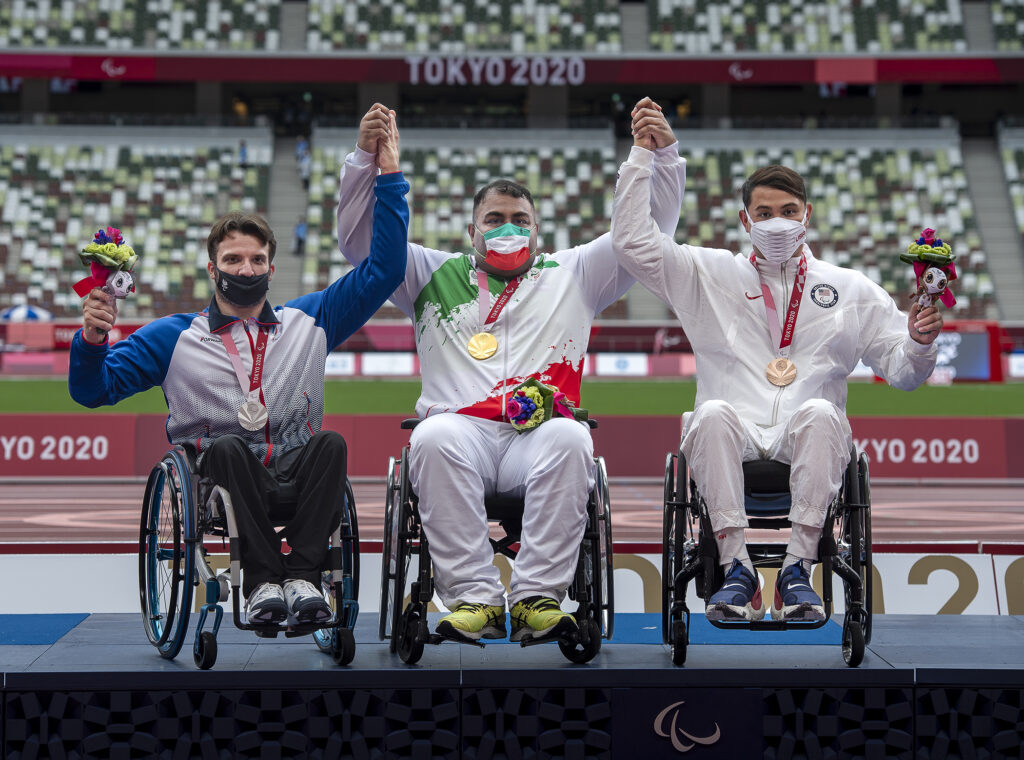
MIB: With all your life experiences, including being out on the world stage twice as a Paralympian, you’d be a great motivational speaker.
JP: Not every great athlete is a great coach, and not every great coach is a great athlete. I believe that to be a great motivational speaker, you grow roots by living first, and I need to do more of that. I want to hit the peak of the mountaintop to be better able to talk about the climb.
As athletes, we take a lot from sports. We take a lot from the crowds and the sponsors. A lot of professional athletes have charities and do different types of community engagement. I believe that as a paralympic athlete, it’s my duty to give back to future generations with the knowledge I’ve learned and the successes I’ve had. In 2022, I hosted five free clinics across the United States along with my friend Max Rohn on our own dimes during competitions called Move United. Max is a disabled veteran from the same war as the guy who shot me. He is a below-the-knee amputee F64 discus thrower and an Invictus Games champion.
MIB: Foundations and non-profit organizations have played a major role in your evolution as an athlete. Are there any you’d like to highlight?
JP: The Great Lakes Adaptive Sports Association gave me the strongest possible foundation to become a two-time Paralympian. My local adaptive sports in Georgia, BlazeSports America, is incredible. Challenged Athletes Foundation gave me my first throwing chair.
I have instructional videos on my social media on how to throw seated javelin that were produced by amazing nonprofits. Anyone who wants help or guidance to get into the Paralympics can send me a direct message on any of my social media platforms, and I will guide them to the best of my abilities. That’s something that I hold near and dear to my heart. None of us have to sit on the sidelines of life.
How To Help
Support parathletes
Many organizations help support parathletes such as Justin, and rely on donations to keep these athletes’ dreams alive. Here are a few to support if you want to contribute to the cause.
- Adaptive Sports Iowa
- BlazeSports America
- Challenged Athletes Foundation
- Great Lakes Adaptive Sports Association
- Invictus Games
- Madonna Rehabilitation Center
- Move United
- United States Olympic & Paralympic Team USA
Support the fight to end gun violence
Join the fight to make real change and end gun violence in your community and throughout the U.S. Get easy ways to take action in our guide: How to Help: Fight Gun Violence in Your Community and Across the Country.
